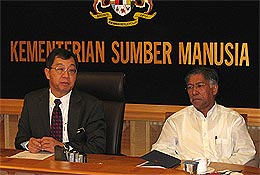THE Malaysian Trade Union Congress (MTUC) in its fight to secure a minimum wage for the private sector employees should make use of the negotiation channels instead of picketing.
MTUC, an umbrella body for Malaysia's eight million private sector workers, estimated that 40 percent of these workers earn less than RM700 per month, mostly working in plantations or factories.
 MTUC
has been demanding that the government comply with its call for a RM900 minimum
wage and a RM300 cost of living allowance (Cola) for the private sector workers.
MTUC
has been demanding that the government comply with its call for a RM900 minimum
wage and a RM300 cost of living allowance (Cola) for the private sector workers.
While it's only fair that these workers too enjoy better wages and benefits, what seemed rather unfortunate is that MTUC resorted to a picketing threat in coercing the government to agree to its demands. MTUC had on June 18 presented a memorandum to the Prime Minister's office giving the government a one-week ultimatum to respond failing which it would turn to picketing, which it did in some parts of the country recently.
It is most disappointing that MTUC failed to realise that the most important of all tools in making any demand was `negotiation'. The congress failed to appreciate the government's willingness to undertake a `dialogue and negotiation' exercise with it and wasted no time in resorting to a series of strikes.
The move by MTUC to demand for a minimum wage was primarily influenced by the government's recent decision to increase the salary for the civil servants. What this congress may not have realised is that this good news only came about after dialogue and negotiation between the government and Cuepacs. If only MTUC had taken this `talk and discuss' approach, then it probably would have made some tangible progress.
Not wise to bulldoze demand
The move to fight for a minimum wage in itself is noble and there is no denying that the government would have been too glad to engage in a dialogue with MTUC if only the congress had shown some patience in tackling this issue.
For the government, the protests' staged by MTUC would only stand to affect the workers as employers are moving elsewhere in view of the rising labour cost. Even investors would think hard before investing in Malaysia. This 'no win-win' situation is what the government is trying to prevent at all costs.
 Human
Resources Minister Dr Fong Chan Onn was quoted as saying that the MTUC should be
practical and drop its demand for a RM900 minimum wage for all private sector
employees. He said if the government was to comply with the demand, the country
would lose its competitive edge.
Human
Resources Minister Dr Fong Chan Onn was quoted as saying that the MTUC should be
practical and drop its demand for a RM900 minimum wage for all private sector
employees. He said if the government was to comply with the demand, the country
would lose its competitive edge.
Fong said the government was prepared to discuss the matter with MTUC but adopting a confrontational approach would benefit no one. Fong said a minimum wage could be introduced for workers in certain sectors such as dock workers and cargo handlers while the minimum wage for others sectors should be left to the market forces.
Perhaps the recent news that the civil servants will soon be enjoying a pay rise might have triggered a reaction in MTUC to achieve the same for the private sector. Effective July 1, all civil employees and security forces would benefit from a pay rise of between 7.5 percent and 42 percent. Also raised is the Cost of Living Allowance (Cola) by 100 percent. This was the first such increase since 1992.
MTUC should in retrospect apply the same approach taken by Cuepacs in fighting for a pay hike for civil servants. Good news finally arrived, albeit taking 15-long years before it finally came about.
To bulldoze a wage rise is not going to work and MTUC hopefully has realised that. Instead of putting the workers welfare at risk it is only wise that it sits down for a discussion on this matter with the government.
Solutions always available
 Ramon Navaratnam, corporate advisor to the Sunway Group told
Bernama
the matter has been outstanding for a long time and that the
government needs to address it soon.
Ramon Navaratnam, corporate advisor to the Sunway Group told
Bernama
the matter has been outstanding for a long time and that the
government needs to address it soon.
"I don't think there is undue pressure here," he said.
Navaratnam, a former economic advisor to the Government said negotiations should always be the method for settling issues.
"Picketing and other instruments should be the last resort, when they believe negotiations are not fruitful," he explained.
 Ramon wished MTUC would also contribute a formula for raising
productivity, to ensure the country's competitiveness in a globalised
environment.
Ramon wished MTUC would also contribute a formula for raising
productivity, to ensure the country's competitiveness in a globalised
environment.
"Otherwise, we may lose jobs instead of gaining salary increases! There has to be a fair and fine balance between wage increase and higher productivity," he said.
National Union of Plantation Workers (NUPW) executive secretary A. Navamunkundan told Bernama that it was in the best interest of the nation that the current wage rates and income distribution be reviewed.
"Over time, the wage system has evolved. MTUC should be given a hearing and solutions to problems can be found if the problem is discussed objectively and realistically. Let us be transparent about information sharing and find a solution," he said.
- Reproduced with permission from Bernama

